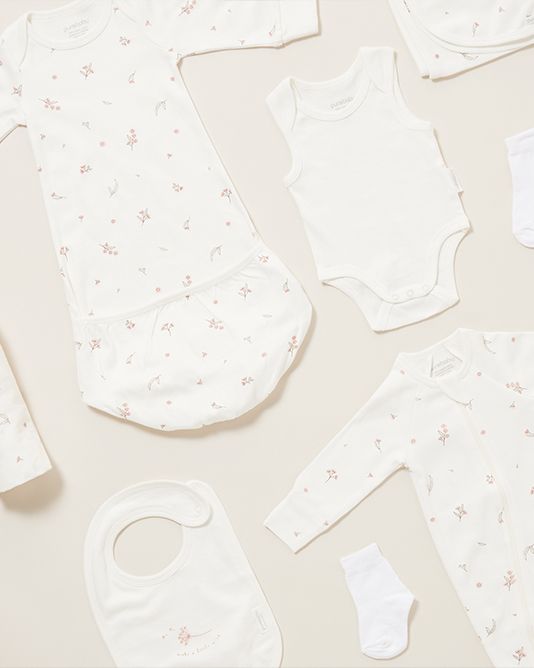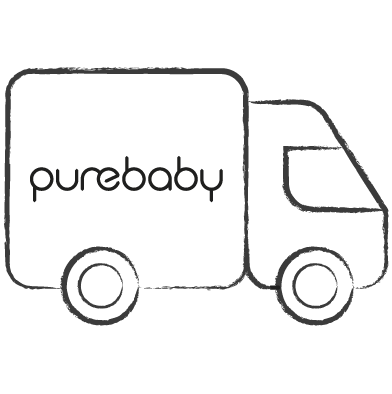So You’ve Become Pregnant: Everything You Need to Know
15 min read | 21 August 2022

Pregnancy and becoming pregnant can be one of the most exciting and pivotal chapters in your life.
Every journey and every story is different, but if this is your first (or second or third) experience getting that positive result, you may or may not know what to do next! The early days may be at times overwhelming to navigate, and the time it takes for that positive result to appear can often feel like an eternity.
So now what? Well first - take a big breath in and out. Your heart might be racing a million miles a minute and your head exploding with many different emotions but remember to check in with yourself and take it step by step. Remember, you do what feels right for YOU! There are no right or wrong answers. Whether you feel like you want to tell someone straight away or wait, the decision is totally yours to make.
As a midwife, and new mother myself - here are some answers to the most frequently asked questions about finding out you're pregnant.
How do I tell my partner I’m pregnant?
After you’ve just seen that double line on that pregnancy test, and you’ve taken a big breath in, you may want to consider how and when you tell your partner that you are pregnant. Some partners may be there when the positive result comes, however, others won’t be. Choose a time that is suited for you to share this wonderful news!
Be as extravagant or as low-key as you want, some keep it nice and simple and blurt the exciting news out and others make it a bit more of a surprise! The choice is yours. Perhaps hiding the test in plain sight could be a creative way to share the news. Kitchen drawer, amongst the letters delivered in the mailbox? Whichever way you end up choosing this experience is just about to begin - this time is precious. Soak in these moments.
When should I tell other people I'm pregnant?
Again, when the time feels right for you and your partner to tell other people. The people around you may or may not know if you were trying to conceive, or alternatively, this pregnancy may be a complete surprise. It is often said that announcing your pregnancy should be kept under wraps until the second trimester, however, this doesn’t need to be the case.
There is no hard and fast rule around this and the reasoning behind keeping a pregnancy a secret until further along, is often in case a miscarriage occurs. However, it is often very important that a mother has the support of those close to her if this does happen. Additionally, some genetic and diagnostic testing is not conducted until later along, so this may play a part in your own journey.
When should I first visit a healthcare professional?
Guidelines in each country may be slightly different, so ask around friends and family about where the best place to start is. Speaking from an Australian background, after finding out you are pregnant the first place you generally begin is the General Practitioner (GP). Whether you find out very early, or if your pregnancy may have been more of a surprise and you find out a little later, the GP is a good place to start. If you have only just missed your period though, seeing a healthcare professional for the first time may be around 6 weeks pregnant. At this first point of contact, blood tests will be ordered and they may ask you to go for an ultrasound.
Side note: Preconception care is incredibly important and can have long and short-term impacts on both your pregnancy and your baby's future. If you are planning a pregnancy, it’s important to seek out advice prior to trying to conceive. Important aspects of this include genetic carrier testing, supplementation specific to what you and your partner need (relating to your blood tests), coming off contraception, alcohol intake and many other lifestyle factors.
During pregnancy, when do you get check-ups?
The first appointment where you meet with your healthcare provider is usually a lengthy one. This is known as the ‘booking in visit’ and it’s usually held between 10-13 weeks. After this, you will normally see your OB or midwife approximately once a month until the third trimester. Into the third trimester, appointments may be every 2-3 weeks.
From full term, which is classified from 37 weeks onwards, appointments are weekly to check in on the baby a little more regularly. This is a generalised guideline and appointments may be more or less often depending on your situation, however, it is important to communicate with your OB or midwife to work out a plan that suits you best. Most facilities will offer a service where you can phone or present to an outpatient department for advice if you feel like something is not right any time day or night.
Do you need to take prenatal vitamins?
Prenatal vitamins are a must if you want to set yourself and your baby up with the best start to life. Prep begins many months before they are conceived (if possible). Prenatal vitamins are just one part of the puzzle. If you can work with a naturopath to have the right supplements prescribed to you based on your blood test, this is ideal. Off-the-shelf prenatal vitamins are generally not the best quality or most potent form, but a naturopath or nutritionist can prescribe you practitioner-grade supplements.
Will pregnancy affect my work?
Remember, you pick the time that is right to tell your employer about your exciting news! You don't have to tell them right away, however, you may need to consider the time needed to attend appointments with your midwife or OB.
Pregnancy should not affect your work, however, depending on your pregnancy or the type of work that you do, this may vary. Every woman's pregnancy is different and some may be complicated by factors that make it difficult to work all the way through. Aches and pains of pregnancy can be more of a challenge in the third trimester, especially coming closer to your due date.
Will pregnancy affect my exercise routines?
Simple answer is no! Although some exercises and activities may need to be modified to be safe during pregnancy. Pregnant women are most definitely encouraged to exercise, and routines should mirror those of your pre-pregnancy lifestyle. It is not recommended to begin anything ‘new’ or �‘push yourself’ with any strenuous activities, or ‘challenge’ like workout plans.
Some exercise types like high-impact activities, planks, traditional sit ups, or movements that require you to lay flat on your belly should be avoided in any part of pregnancy. If you are unsure, chat with a pregnancy or women's health physiotherapist.
What do I need to stop eating or drinking?
Studies show that there is no known safe amount of alcohol that can be consumed during pregnancy. Drinking alcohol can cause fetal alcohol syndrome, miscarriage, and even stillbirth. So in saying that, it is not recommended to drink alcohol when pregnant. Some foods like soft cheeses (that are not pasteurised), deli meats, raw fish and undercooked eggs should also be avoided when pregnant. These are at higher risk to contain bacteria that could be dangerous to a developing baby. Learning about what you can and can’t eat and drink while pregnant will ensure the healthiest possible pregnancy.
What are some of the upcoming costs?
Depending on what country you live in, and whether you have chosen public or private healthcare, costs during pregnancy can vary. Some costs during pregnancy can include: doctor and hospital bills, ultrasounds, other medical tests, antenatal parenting classes, and even maternity clothes! After the baby is born some upcoming costs may include setting up the nursery with a cot and a change table, a pram, baby clothes, nappies, and swaddles.
When do I need to choose a baby name?
Choosing a baby's name can be a challenging task. Some families know even before their baby is conceived, other babies can go days or even weeks after birth without a name. Some families may begin with a short list of their favourite names as the due date approaches. Once they meet their little one, a name may stick and suit their appearance or personality! However in Australia, each state does have time constraints to choose a name. For example, if you are in NSW, all births must be registered within 60 days of the birth (and the baby will need a name by this point).
Should I join a parenting support group?
Parenting support groups are a great idea! Depending on your location or the model of healthcare you have chosen, different options may be available to you. Parenting support groups can be face-to-face within your local area or completely online like Facebook groups, etc. Sometimes hospitals can create support groups and mothers groups with women who are facing the same journeys or are due around the same months. Asking friends or family around the area is a great place to start. Parenting groups are a fantastic place to meet new parents and share thoughts and experiences of this newfound parenthood.
How do I check my family's health history?
Begin by asking them! Usually, hospitals don’t require information further back than your mother and father/partner's mother and father unless it is significant. Significant health issues surrounding genetics/chromosomal abnormalities, anaesthetic complications, cardiac issues, endocrine issues, and respiratory issues might be of interest to your healthcare provider. Other conditions like diabetes, blood pressure issues, and vision/hearing impairments may also be important. You may even be asked if there are twins or triplets in your family!
Genetic testing is another amazing way that you can find out more about your DNA. Although this isn’t always offered by GP's, genetic carrier screening is incredibly important. 90% of babies born with a genetic condition have no family history of it. It’s important to understand both your and your partner's DNA, and what you are a carrier of.
When should I start buying baby clothing and products?
Preparing for the arrival of your little one, can include buying all those cute little outfits and functional products. You can start buying these whenever you want! By the third trimester you begin to think about the season that baby is going to be born in and what type of clothes he or she may need. Babies grow so quickly, so aim for a range of sizes! They may only be in newborn sizing for a few weeks, then move into size 0-3 months.
What should I ask my midwife or OB?
Knowledge is power and education during pregnancy is so important. Ask as many questions as possible. Take advice from your midwife or OB - there is no such thing as a silly question.
Your midwife or OB will provide information that is relevant to your pregnancy step by step, and cover all the important avenues. Parenting education sessions or antenatal classes are a great resource where you can get all the extra info you may need. These generally cover a lot of information that will be handy for you to know.
Before you choose your care provider you can ask questions around the care they provide, for example, how many visits will I have with you, what is your vaginal birth rate, do you have a backup in case you can’t make my birth? Now is the time to discuss any concerns you may have.
As you come closer to your due date, questions may surround labour and birth such as:
How does labour start?
When do I come to hospital?
What pain relief options are available?
How many support people can I have?
How long will I stay in hospital, and can my partner stay?
If you write down questions when you think of them, between visits - simply take this list in and you can chat through any queries or concerns.
This blog is written by Aliza Carr, a registered midwife from Bumpnbub. All advice is general advice only and should not replace the need for medical advice from your healthcare provider.








